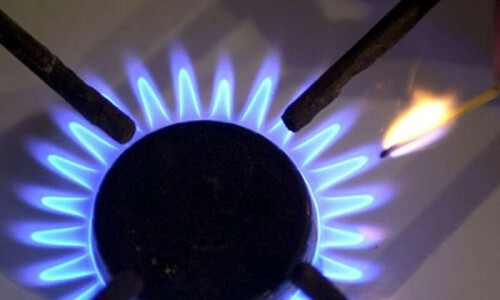The caretaker government in a press conference on Tuesday said the reasons behind the caretaker cabinet’s approval of the steep hikes in fixed monthly charges and consumer rates for natural gas would help ease the fiscal deficit.
In a press conference, Energy Minister Muhammad Ali stated that for the past decade, Pakistan has been unable to meet the local demand for gas without the help of imports, which had resulted in a significant decrease in Pakistan’s foreign exchange reserves.
“Because of rising fiscal deficit, we were prone to more borrowing,” he stressed. “These loans are making us more vulnerable to inflation.”

For the past decade, most of the international companies for natural gas exploration— except for four — have left Pakistan because of losses, he said, rendering Pakistan unable to meet its demands without imports.
“In January 2022 inflation was 13pc and in January 2023, it was 27pc.”
‘Increasing circular debt’
He emphasised — with the help of bar charts — the importance of curbing circular debt. “Circular debt has increased to Rs2,100 billion,” he added. “And if we did not stop it, it would have gone to Rs2,400 billion.”
‘Will not be a burden on the poor’
The energy minister further broke down how the increment in gas price rates affected different sectors.
He assured that 57pc of the population will not bear the brunt of this hike, as a fixed charge has been put in place to ensure that their bills do not exceed Rs1,300. “The tariff will increase with consumption. The rich will pay more.” He highlighted this was a “progressive” hike which will not impact the vulnerable segment of society.
“The 57pc of the population — which falls under the protected category — will not bear the brunt of this hike,” he stated, they will still enjoy a subsidy of 66pc.
Another sector he talked about was fertiliser, he stressed that the local farmers will not be affected by the hike.
“We have tried to reduce the disparity between the north and south industries,” he underscored that the factories in the north often paid double of those in the south.
“If anyone wants to set a new factory, they are at a disadvantage of paying more for gas,” he said, “which has reduced competition in Pakistan.”
This hike seeks to create a cohesive order where both north and south industries will follow the same gas price rates, which will increase competition and, as a result, employment.
The minister of energy ended the press conference stating that although this hike was necessary, no sudden massive hike will be enforced in the future.
Subsidy
A Rs 384 billion gas subsidy will be introduced for domestic, tandoor, and the fertiliser industry. The minister elaborated that Rs139 billion would be allocated to domestic consumers, Rs45 billion to the fertiliser sector, and Rs200 billion to roti tandoors.
“The government has completely unchanged the sale price for gas supplies to Roti tandoors because “Roti” is a prime and foremost necessity” he added.
Additional input from APP














































Dear visitor, the comments section is undergoing an overhaul and will return soon.